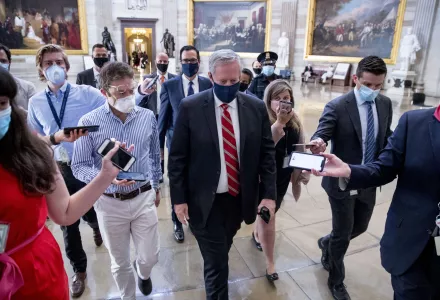
Our weekly COVID-19 and Economic Diplomacy tracker looks at policies that impact the coordination of international governments and central banks, ongoing commentary and analysis, and asks what these turbulent times mean for economic diplomacy.
We’d love to hear what you think. Send us your comments, and be sure to follow us on Twitter @BelferEDI.
The Highlights
- Formal negotiations over U.S. coronavirus response legislation began this week. The proposed $1T GOP plan slashes unemployment benefits from $600 to $200 per week, another round of $1,200 stimulus checks, and $100B for the small business PPP. There are reports that the bill may also include language to alter leverage ratio calculations to allow firms to load up on riskier assets.
- The ECB announced a continued freeze on dividend payments until January. Europe’s economy continues to recover as Germany’s economic recovery drives hopes that the country will bring the eurozone out of the recession.
- The IMF granted South Africa $4.3B the single biggest allocation of emergency financing from the IMF yet for a pandemic-hit country. Latin America’s struggle to respond to the pandemic may be linked to weak state capacity more than any other factor.
Global Developments
- The Economist argues that the pandemic offers an opportunity to rethink macroeconomic policy going forward. A new era of economic policy consists of four defining features: unprecedented levels of government borrowing, increased money supply, government’s role as capital-allocator-in-chief, and low inflation. Though a product of the pandemic, current policy is the culmination of long-term trends.
U.S. Developments
As the benefits in the CARES Act expire at the end of this month, Congressional leaders struggle to reach a bipartisan coronavirus relief bill.
- Congressional leaders continue to negotiate a bipartisan coronavirus relief bill as unemployment benefits end this week. Senate Republicans and the White House’s plan totals $1T while the House Democrats bill passed in May totals $3T. The GOP plan includes cutting federal unemployment benefits from $600 to $200 per week until states phase in a new formula in two months that would pay the unemployed 70 percent of their income. It is unclear whether states will be able to do so in such a short amount of time. The bill also includes another round of $1,200 stimulus checks, $100B for the small-business PPP, and $1.8B for the construction of a new FBI building in Washington. The Washington Post offers a breakdown of key components of the GOP HEALS Act.
- The GOP coronavirus relief plan reportedly will include language giving the Federal Reserve authority to allow firms to load up on riskier assets. This would change a restriction implemented during the 2008 financial crisis to prevent banks from engaging in risky behavior. The proposed legislation would give regulators the discretion to let banks exclude certain items from their balance sheets when calculating their leverage ratio.
- Nominee for the Federal Reserve Board, Judy Shelton, faces a rocky confirmation process. Senators Susan Collins and Mitt Romney have announced they will not vote for Shelton’s confirmation. An unconventional pick, her candidacy’s controversy stems from her close ties to the Trump campaign as an advisor and her unconventional views of pushing for a gold standard. Shelton needs a simple majority Senate vote. Assuming no Democrats support her, she would need to avoid losing an additional two Republican votes in order to be confirmed. Steven Rattner penned an op-ed in the New York Times opposing Shelton’s nomination.
- The Federal Open Market Committee met on Tuesday and Wednesday to discuss the best way to deliver more monetary support. As Covid-19 cases surge in the U.S., the Fed pledged not to raise interest rates and that it will keep its programs in place until the “pandemic and economic fallout are behind us.” It will extend its dollar funding program for foreign central banks through March 2021 and extend the emergency-lending programs. Jerome Powell, chair of the Fed, stated that the pace of recovery has slowed and predicts that there will likely be a need for more monetary and fiscal policy support in the future.
- Simon Tilford and Hans Kundani argue that it is time to abandon dollar hegemony in Foreign Affairs. Financial institutions and big businesses primarily benefit from dollar primacy while the costs are borne by workers, threatening to deepen inequality in the U.S. Though there is little demand globally to diversify their currency reserves, the U.S. could unilaterally and voluntarily abandon dollar hegemony due to the growing domestic economic and political costs.
European Developments
Due to its overall successful public health response to the pandemic, the European economy shows signs of slowly recovering.
- The ECB called on lenders to continue to freeze dividend payments until at least January. The institution also urged banks to set “extremely moderate” staff bonuses. The central bank’s recommendations are designated to help banks absorb losses and support lending. Bank shareholders are frustrated by the announcement stating that while the continued freeze was expected, they have yet to get clarity on metrics or benchmarks needed for distributions to start. Initially, the ECB ordered banks to halt dividend payments in March until at least October.
- Almost 1.2M British businesses have borrowed more than £50B. Most of the loans were lent through the “bounce back” scheme which allows very small companies to borrow up to £50,000 with minimal assurances on their ability to repay. The Office for Budget Responsibility estimates that up to 40 percent of businesses could default. The Treasury has lent more than £500m via its Future Fund scheme to start-ups.
- Confidence in Germany’s business climate exceeded expectations. The monthly business climate index showed a reading of 90.5 in July compared to the 86.2 in June. The rise was driven by businesses’ assessment of current conditions, expectations for the future, and the recovery of the service sector. The survey raised hopes that Germany could pull Europe out of the recession. However, optimism among German companies has not yet climbed to pre-pandemic levels. Germany’s overall recovery tracks with the continent’s larger recovery which is gathering pace as reflected in a set of business surveys.
Emerging Markets
- The IMF granted South Africa a $4.3B loan, the single biggest allocation of emergency financing from the IMF yet for a pandemic-hit country. South Africa has reported 450,000 cases, accounting for approximately 50 percent of the continent’s reported cases to date. The government faced a record budget deficit this year; state debts are at dangerous levels and the country has lost investment-grade credit ratings for its borrowing. South Africa has already tapped over $1bn in official pandemic financing from development banks.
- Lockdowns in Latin America have not been as effective in flattening the curve as in Europe. While Brazil’s President tells its citizens that the virus is a mere sniffle to be faced “like a man,” the number of Covid-19 related deaths is comparatively less than Chile and Peru which implemented European-like lockdowns. Though there are questions regarding the data, the real problem may be state capacity weakness.
Odds and Ends
- Emma Ockerman reports on the eviction crisis and its disproportionate impact on Black and Latinx communities. More than 12.5 million renters reported they were unable to make their most recent payment and nearly 24 million people have little to no confidence in their ability to pay next month’s rent. Approximately 56% of these renters are Black or Latinx. The CARES Act eviction protection program for tenants in federally backed properties expired last week.
- Gabriel Sanchez, Edward Vargas, and Adrián Pedroza write for Brookings on how Covid-19 is having a devastating impact on the economic well-being of Latino families. In a survey conducted by the article’s authors, 29% of Latino families have had someone in their household lose their job and 33% of Latino parents/primary caregivers have experienced significant business losses with 41% of families having trouble paying for rent or their mortgage.
- The pandemic is worsening educational inequality as school goes online. In the United States, the Department of Education estimates that 1 in 8 children do not have internet access via a desktop or laptop at home. Even students who do have internet access are likely to fall behind. Moreover, once in-class instruction resumes, a survey by British think tank Institute for Fiscal Studies found that poorer parents were less inclined than rich ones to send their children back to school at the earliest opportunity.
- As more people shop online or pay with contactless cards or phones during the pandemic, the idea of central-bank digital currency (CBDC) is gaining traction. Roughly 80% of central banks are doing some kind of CBDC work as China tests the digital yuan and Sweden is close to testing its e-krona. The Economist states that the push towards CBDC is motivated by defending against risks, such as the failure of online payment systems and the migration of digital payments to private networks offered by Facebook, Tencent, and other big tech firms.
- The Financial Times interviewed global experts on the impact of the pandemic. Those interviewed include Bill Gates, David Miliband, Phumzile Mlambo-Ngcuka, and Kristalina Georgieva.
Suh, Hannah. “This Week in COVID-19 and Economic Diplomacy: ‘GOP Unveils Pandemic Response Plan’.” July 30, 2020


